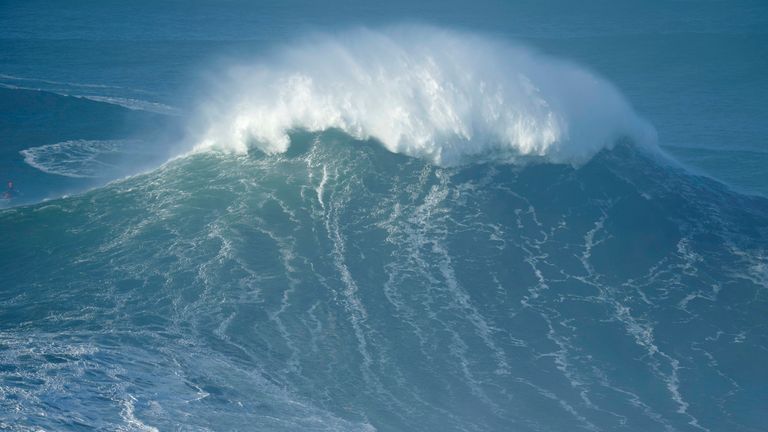Most extreme 'rogue wave' on record confirmed in North Pacific Ocean
The November 2020 "killer wave" was so extreme, such an event is believed to only happen once every 1,300 years.
Monday 14 February 2022 15:14, UK
The most extreme "rogue wave" on record has just been confirmed in the North Pacific Ocean.
In November 2020, a freak wave lifted a single buoy off the coast of British Columbia 17.6 meters high (58ft) and the four-storey wall of water has now been confirmed as the most extreme ever recorded.
Such an event is believed to only happen once every 1,300 years.
However, a recent study predicts wave heights in the North Pacific will only increase with climate change - meaning the 2020 wave may not hold the record for long.
For centuries, "rogue waves" were considered nothing more than nautical folklore, but in 1995, on the first day of January, a 26-meter high wave (85ft) struck an oil drilling platform off the coast of Norway.
At the time, the so-called Draupner wave defied all previous scientific models.
Since then, a dozen rogue waves have been recorded, some even in lakes. Their tendency to occur unexpectedly and with huge force makes them especially dangerous.
While the one that surfaced in November 2020 was not the tallest, its relative size compared to the waves around it was unprecedented.
A rogue wave is defined as one that is more than twice the height of the waves around it.
The Draupner wave was 25.6 meters tall - compared to neighbouring waves which were only 12 meters tall.
Meanwhile, the Ucluelet wave was nearly three times the size of its surroundings.
"Proportionally, the Ucluelet wave is likely the most extreme rogue wave ever recorded," Said Dr Johannes Gemmrich, of the University of Victoria.
"Only a few rogue waves in high sea states have been observed directly, and nothing of this magnitude. The probability of such an event occurring is once in 1,300 years."
"The unpredictability of rogue waves, and the sheer power of these 'walls of water' can make them incredibly dangerous to marine operations and the public," added MarineLabs CEO, Dr Scott Beatty.
"The potential of predicting rogue waves remains an open question, but our data is helping to better understand when, where and how rogue waves form, and the risks that they pose."




